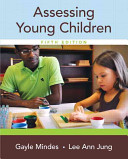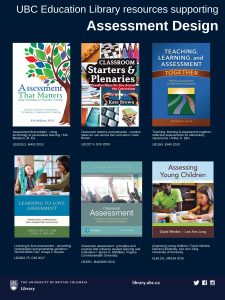Listed below are selected resources for teachers related to assessment design.
Assessment: Evidence-based teaching for enquiring teachers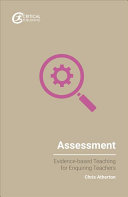
by Chris Atherton
Grades: K-12
Provides a critical overview of assessment, taking an evidence-based approach, with balanced and reflective consideration given to arguments around various approaches to assessment in schools. Offers practical advice on how to implement such evidence-based models reflectively evaluating their success.
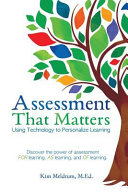 Assessment that matters: Using technology to personalize learning
Assessment that matters: Using technology to personalize learning
by Kim Meldrum
Grades: K-12
This book provides readers with an understanding of the role that technology as a tool for learning must play in the education of today’s students. It details three types of assessment that richly inform teacher practice: assessment as learning, assessment for learning, and assessment of learning.
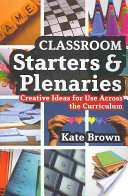 Classroom starters and plenaries: Creative ideas for use across the curriculum
Classroom starters and plenaries: Creative ideas for use across the curriculum
by Kate J. Brown
Grades: K-12
The author presents a variety of techniques for kickstarting students’ demonstrations of what they’ve learned, including “in your own words” activities, physical activities, games and game shows, and more.
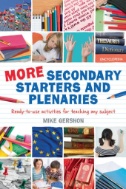 More secondary starters and plenaries: Creative activities, ready-to-use in any subject
More secondary starters and plenaries: Creative activities, ready-to-use in any subject
by Mike Gershon
Grades: 9-12
This book includes 50 starters and 50 plenaries which have been crafted to fit with the structure of teaching, rather than specific content. The activities are organized into useful divisions such as Assessment for Learning, Concepts, and Learning Objectives, and each includes a brief rationale for the activity.
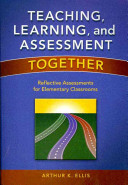 Teaching, learning and assessment together: Reflective assessments for elementary classrooms
Teaching, learning and assessment together: Reflective assessments for elementary classrooms
by Arthur K. Ellis
Grades: K-6
The author presents strategies for the elementary classroom which engage students in activity and reflection, and which allow for the integration of teaching, learning and assessment. Strategies include such things as “the week in review”, “I can teach”, “letting questions percolate”, and more.
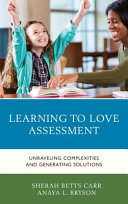 Learning to love assessment: Unraveling complexities and generating solutions
Learning to love assessment: Unraveling complexities and generating solutions
by Sherah Betts Carr and Anaya L. Bryson
Grades: K-12
The authors offer concrete techniques for educators at all levels to cultivate and implement over 50 effective classroom assessment strategies, including formative, student peer and self-assessment; data dialogues, technological tools, and PBL3 (problem, project and performance-based) assessments.
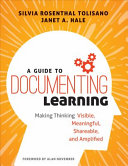 A guide to documenting learning: Making thinking visible, meaningful, shareable, and amplified
A guide to documenting learning: Making thinking visible, meaningful, shareable, and amplified
by Silvia Rosenthal Tolisano and Janet A. Hale
Grades: K-12
This book helps educators explore what learning is by presenting ways in which they can look for, capture, reflect on, and share learning to foster meaningful and active student engagement.
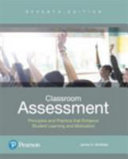 Classroom assessment: Principles and practice that enhance student learning and motivation
Classroom assessment: Principles and practice that enhance student learning and motivation
by James H. McMillan
Grades: K-12
The new edition of this book emphasizes formative assessment, and includes in-depth coverage of self-assessment; the impact of standards-based accountability testing, 21st-century knowledge, dispositions and skills; technology-enhanced items; and assessment of culturally diverse students.
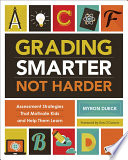 Grading smarter, not harder: Assessment strategies that motivate kids and help them learn
Grading smarter, not harder: Assessment strategies that motivate kids and help them learn
by Myron Dueck
Grades: K-12
The author offers strategies for ensuring that grades measure what students know without punishing them for factors outside their control; examining the fairness and effectiveness of grading homework assignments; designing and distributing unit plans that make assessment criteria clear to students; and creating a flexible and modular retesting system so that students can improve their scores on individual sections of important tests.
by Gayle Mindes and Lee Ann Jung
Grades: K-3
This book addresses a broad range of assessment issues in early childhood and discusses how to deliver an effective educational program for all young children It prepares teachers to assess young children in a variety of settings, including inclusive environments, and also discusses working with children from diverse cultural backgrounds.
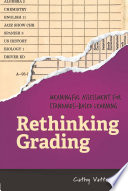 Rethinking grading: Meaningful assessment for standards-based learning,
Rethinking grading: Meaningful assessment for standards-based learning,
by Cathy Vatterott
Grades: K-12
The author examines and debunks traditional practices and policies of grading in K-12 schools, offering a new paradigm for standards-based grading that focuses on student mastery of content and gives concrete examples from elementary, middle, and high schools. (Also available online.)
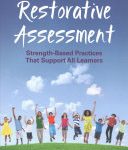 Restorative assessment: Strengths-based practices that support all learners,
Restorative assessment: Strengths-based practices that support all learners,
by Laura M. Greenstein
Grades: K-12
Unlike ordinary testing, restorative assessments offer students multiple ways to demonstrate their learning, which promotes equity and reduces conflict. This book provides real-world examples of restorative assessment in practice, research on personalized learning and assessment, and practical strategies for implementation.
 Cripping labor-based grading for more equity in literacy courses,
Cripping labor-based grading for more equity in literacy courses,
by Asao B. Inoue
Grades: Higher education
This book offers an expanded and compassionate discussion of labor-based grading, a practice that involves negotiating a set of classroom agreements with all of the students in a course to determine how much labor will be expected of students and how it will be accounted for or identified to earn particular final course grades. Inoue focuses his exploration of labor-based grading by asking, “How can labor-based grading evolve so that it addresses the concerns around inequitable access to or expectations of labor that students with disabilities, neurodivergencies, illnesses, or limited time in the semester may face?”
Note: you may find the subject heading “educational tests and measurements” to be useful in finding additional materials.
Finding More Resources
To find more resources in this area, try the following:
- Search using the General tab on the UBC Library website to look for material in all UBC Library branches.
- Search using “Search Education Resources” box in the left hand bar on the Education Library website to limit your results to physical materials in the Education Library.
- Use specific search terms, such as “assessment design”, “educational tests and measurements”, “educational evaluation”, or “grading and marking (students)”.
- To find lesson plans, include “lesson plans”, “lesson planning”, or “activity programs” in your search terms.
For more help with searching, please visit the Library Service Desk or e-mail ed.lib@ubc.ca.

